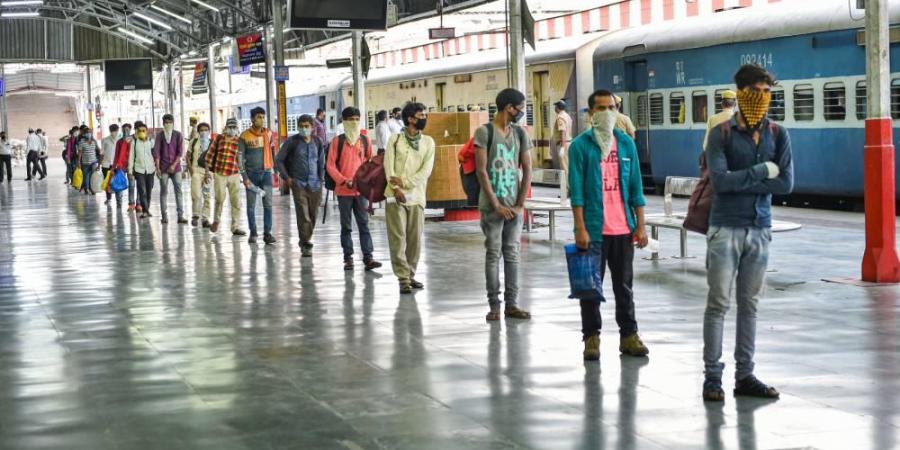
Hunger drives back to work migrants who made long journeys home

Hunger and hopelessness drove tens of thousands of migrant workers from cities of their dreams, vibrant and pulsating with life and activity, to languorous villages in Bihar during the lockdown.
It’s hunger and hopelessness again that is pushing them back to the cities in Gujarat, Maharashtra, Karnataka and Telangana, and the sprawling farms of Punjab, disregarding the threat of the coronavirus disease that had brought them to their knees.
Their employers, many of whom had virtually abandoned them, are sending them train and even flight tickets to bring them back as factories whir back to life, construction activity picks up, and the sowing season has started. Mail and express trains to places like Ahmedabad, Amritsar, Secundrabad, and Bengaluru, from where these workers hurried back home, walking, cycling, and travelling on trucks and even the hollow of container trucks and concrete mixing plants, are running to capacity.
Chief Public Relations Officer (CPRO), ECR, Rajesh Kumar, told PTI that the railways is closely monitoring the waiting lists and quickly updating reservation status to facilitate travel.
According to sources in the East Central Zone of the railways, the average occupancy in Muzaffarpur-Ahmedabad Special is 133 percent, Danapur-Secundrabad special (126 percent), Jaynagar-Amritsar special (123 percent), Danapur- Bengaluru city special (120 percent), Patna-Ahmedabad special (117 percent), Saharsa-New Delhi special (113 percent) and Danapur-Pune special (102 percent).
“If need arises, more trains can be run on routes witnessing heavy traffic,” he said. ECR includes Danapur, Sonepur, Deendayal Upadhyaya, Samastipur and Dhanbad railway divisions.
Related News: No data given for migrant job scheme: Sitharaman takes a dig at TMC
A report from north Bihar’s Darbhanga district said luxury buses and other vehicles with Maharashtra, Punjab, Haryana, and Andhra Pradesh number plates could be seen transporting migrants back to their places of work. Several companies in the manufacturing, industrial goods, and real estate sector have even chartered aircraft to bring back their skilled and semi-skilled employees.
“Whatever money I had has been spent. I don’t know when I will get the job card for working in MNREGA projects. We may die of hunger staying here and protecting ourselves from coronavirus,” said Kusho Mandal of Anandpur village, who worked as a farmhand in Punjab before the lockdown began.
The fields of Punjab are beckoning Rajeev Chaupal of Ratyari-Khirikpur village, too. “I am returning to the farm of my employer in Punjab. He has promised me handsome cash,” he said. They said they are being offered Rs 5,000 for planting paddy saplings on an acre of farmland instead of Rs 3,500 that was the going rate before the outbreak. Their families are also getting paid Rs 15,000-20,000 advance.
Related News: COVID-19 lockdown: Migrants renovate school-turned-quarantine-centre
People like Mandal and Chaupal are leaving for their old places of work despite the launch of Rs 50,000 crore Garib Kalyan Rojgar Abhiyaan by Prime Minister Narendra Modi to give a fresh impetus to rural livelihood.
The campaign, launched in mission mode, will be implemented in 116 districts, each having over 25,000 migrant workers, in Bihar, Uttar Pradesh, Madhya Pradesh, Rajasthan, Odisha and Jharkhand.
Hailing the scheme, Chief Minister Nitish Kumar had said more than 20 lakh natives of the state had returned during the lockdown, and the campaign will complement his government’s efforts to generate employment for them.
He had promised them employment in their villages so they were not forced to go back to other states for livelihood. The promise, however, has apparently failed to inspire confidence among migrant labourers of Bihar, who have been working in the factories and farms of Delhi, Maharashtra, Kolkata, Andhra Pradesh, Telangana, Punjab, and Haryana for years.
“It has been a month-and-a-half now since I returned from Punjab. I haven’t got the job card yet to help me get work. Even if I do get it, I will receive Rs 192 a day as wages. I will get much, much more working in the fields of Punjab,” said Prithvi Mukhiya of Ratyari village.
Related News: Hometowns hold no jobs; migrants get back to cities amid COVID
Vishal Kumar of Chulhan Bigha village in Arwal district worked at a shop in Mumbai before he took the arduous journey back home. “My search for a suitable job has not been successful so far. I will wait for some more time. If I don’t get one, I will go back. My employer was paying me a salary of Rs 16,000 a month. He has told me I can come anytime and resume duty,” he said.
Bihar, with widespread poverty and consequent cheap labour, has been a favourite hunting ground for entrepreneurs from outside who are facing a shortage of hands as the government seeks to rev up the engines of the economy. They are using all their blandishment and benevolence to bring these workers back to their factories and farms.
According to media reports, a Bengaluru-based real estate firm flew a group of carpenters on a chartered flight from Patna to Hyderabad. Another real estate company based in Chennai chartered an aircraft to transport 150 skilled workers from Patna.
Over 200 workers, who had come to Bihar for Holi and had to stay back due to the lockdown, had returned to Telangana in the first week of May itself. Home is where the heart is, so goes the adage. But hunger is one reality that knows no boundaries — not even those erected by the fearsome coronavirus — as thousands make their way back to places of work from Bihar, putting behind the travails of the biggest exodus since Independence.

